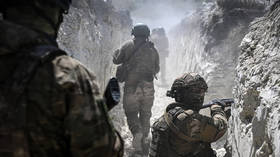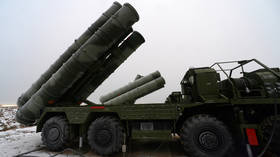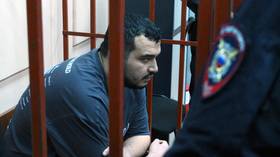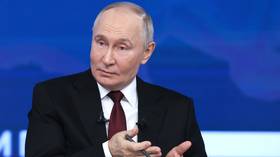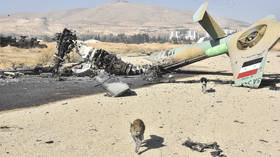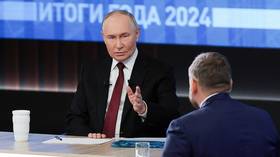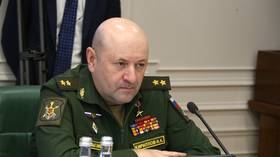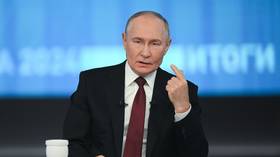“Iran sees double standard in US policies”
Will President Obama deliver on his pledge to forge closer ties with the Middle East and what needs to be done to bring peace to the region? Professor of International Relations Stephen Zunes spoke to RT on the issue.
Doctor Stephen Zunes is both a scholar and an ardent critic of US foreign policy toward the Middle East, and has also held several meetings with top government officials, opposition leaders and journalists in the Middle East.
RT: Dr. Zunes, thank you so much for joining us today. Barack Obama has made his way through the Middle East trying to appeal to the Arab world. He gave that big speech in Egypt. Let’s talk about rhetoric versus action. Are we going to see a dramatic change in US foreign policy toward the Middle East under the Obama administration, and if so, what kind of change is it going to be and toward which countries specifically?
Stephen Zunes: There will definitely be some changes, insignificant changes, but the overall role of the United States in the Middle East, the desire to be the hegemonic power is certainly going to remain constant. In many ways, Obama is a clean break from the neoconservative ideology of the Bush administration, this idea of unilateralism, the idea of the emphasis on military solutions on complex political problems.
I think we’re going to see a shift there. But at the same time they rest on certain assumptions that the United States has a right and interest and obligation to intervene in other means, in what you might call a “soft power”, you know, somewhat more benign imperialism, if you will.
I think that you know we may see some real progress on Iran. Perhaps a quid pro quo on the nuclear questions. In Israel-Palestine we’re already seeing something of a shift that stresses not just Palestinian obligations but Israeli obligations as well. And I think we’ll see more active involvement in the peace process there.
Where I don’t see much of a change unfortunately is around the area of merging human rights and democracy while rejecting the neo con line about democracy promotion as an excuse for intervention. He seems to have fallen back to the realpolitik idea of just sort of giving lip service to democracy while helping prop up dictatorships like Saudi Arabia and Egypt.
RT: How does Barack Obama, or any other US president for that matter, really make some tough decisions in the Middle East, especially when it comes to dealing with Israel, because it’s a very delicate balancing act when you have powerful right-wing pro-Israel lobbies here in the United States that affect domestic politics so much? Is Obama going to be able to overcome that?
SZ: I think he certainly can overcome that, especially since there is a big shift in thinking among the foreign policy establishment. They realize that in giving carte blanche to Israel, even putting aside the moral and legal questions, is in the long term hurting US strategic interests. So, I think he can overcome that, particularly since there’s been a big shift in thinking within the Jewish communities, especially younger American Jews who either don’t particularly identify with Israel, or if they do they tend to identify more with the peace camp – the Israelis who are willing to make the necessary compromises for peace.
RT: On the Israel-Palestine question, presidents before Obama have tried unsuccessfully to sort of mend fences and create a long-lasting peaceful treaty. What does Barack Obama have to do to ensure peace from both sides? Is he going to have a different fate than others before him who have tried and failed?
SZ: I think he’s the first president who realizes that there really cannot be peace unless there is a viable Palestinian state alongside Israel. That’s why he’s pressing for a settlements freeze, because the more settlements expand in the West Bank, it just makes logistically the establishment of such a contiguous entity impossible. I mean the settlements have more than doubled since the signing of the Oslo Accord in 1993. So Obama realizes that time is running out, so he’s been surprising some people, in fact, that he’s really sticking to his guns in this one.
RT: America’s relationship with Israel draws a lot of questions, some controversy here at home and all over the world. Why maintain such a closeness? Because you have written that even Washington’s closest Arab allies could never substitute its close relationship with Israel – why is that?
SZ: For one thing, unlike these other countries, there’s not a threat of a coup or revolution. It’s a government. It is going to be a pro-western government in the foreseeable future. And the other countries in that part of the world, it’s a bigger question mark. The Mossad and the CIA cooperate in intelligence gathering and in covered actions. They have a lot more Arabic speakers and knowledge of the area than we do here. They funnel arms to third parties the US cannot give directly to for political reasons. They played all sorts of surrogate roles for the United States that even these autocratic governments would be either unwilling or unable to do.
RT: When we talk about peace in the Middle East we cannot leave Iran out of the equation. You were among a group of religious leaders and scholars who actually met with Ahmadinejad back in September of 2007. What were your impressions, and is there any hope of kind of changing up the rhetoric on the Iranian side?
SZ: I wasn’t very impressed with Ahmadinejad himself. But the fact is that on many of the key issues, even though he is not all that popular with the Iranians, that some of the basic positions on the nuclear questions indeed has widespread support. And basically this double standard the United States has – allies like Israel and Pakistan and India can have these full-blown nuclear arsenals, but Iran can’t even have the potential to build nuclear weapons, is hypocritical at face value. And so, Iranians know this, and Iranians see this kind of double standard. So it’s not about fear of proliferation per se, it’s a fear of challenging the US-Israeli nuclear monopoly in the area.
RT: Speaking of hypocrisy, you have said that the United States shows great hypocrisy when it comes to human rights and international law. How so and can you say in specific examples?
SZ: You know, quite a few. We have heard for years concerns about human rights abuses by countries United States doesn’t like but seemingly free pass for its allies. I remember President Bush talking about spreading democracy from Damascus to Tehran. And while I agree that Syria and Iran could certainly use more democracy, it’s interesting how he didn’t talk about spreading democracy from Riyadh to Cairo. And while Obama made some good general remarks about human rights and democracy, there’s a lot of disappointment that he wasn’t more pointed in his meetings with Mubarak in Egypt and the king in Saudi Arabia to press this issue.
RT: When we talk about the rule of law, there’s lot of controversy within the United States about Guantanamo Bay, about the issue of torture. Obama has denounced torture, yet he refuses to investigate former Bush officials, even members of the military, who have been accused of war crimes, of committing acts of torture. He wanted to release those photographs showing detainee abuse; then he changed his mind. He appointed McChrystal to be the new US commander there in Afghanistan, McChrystal has been accused of overseeing these kinds of crimes. What do you make of all of this?
SZ: I think it’s an example that the President of the United States is not necessarily the most powerful force in America.
RT: Who is?
SZ: It’s not a single individual, but there are various powerful strategic and economic interests. Even a relatively enlightened president and a relatively intelligent moral president which I think Obama in fact is, is not himself enough to overcome some of these more powerful interests. But we are going to have to be more morally and legally consistent, we need to support UN Security Council resolutions not just when it involves countries like Iran or Sudan but also, you know, countries like Israel or Morocco. We need to show a leadership that’s based on the values we claimed to profess such as freedom, democracy and the rule of law.
RT: You wrote an article entitled “Why is the United States continuing to tell the Lebanese how to vote”. Did you ever find the answer to this question?
SZ: We profess, I believe, an electoral democracy. We are not happy when elections don’t go the way we want them to. There is concern that the coalition dominated by Hezbollah could become the largest vote-getter.
But you know this idea they’ll become a terrorist state or that kind of thing is a hyperbole. Lebanon is all about coalition politics. And the reason that Hezbollah has gained popularity and support is, even though it has what I see as a rather reactionary political and social agenda, it is the only really populist party in the country. These other parties, particularly the ones backed by the United States, tend to be run by the same elite families that had been running the country for generations. And I think history shows the US would be a lot better off if we just leave them to their own devices and let them figure it out themselves.
RT: Thank you so much.
SZ: My pleasure.


